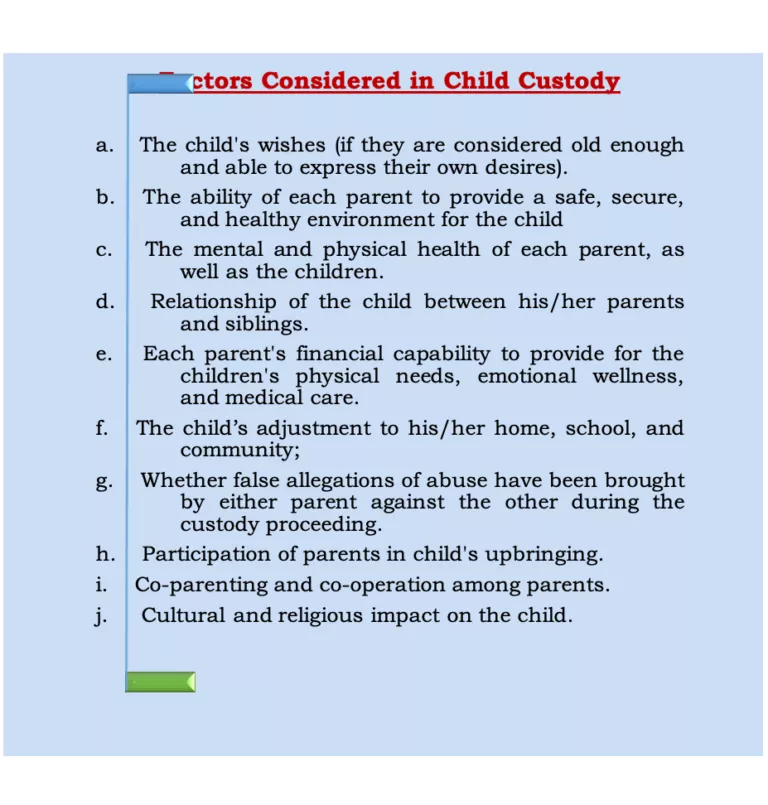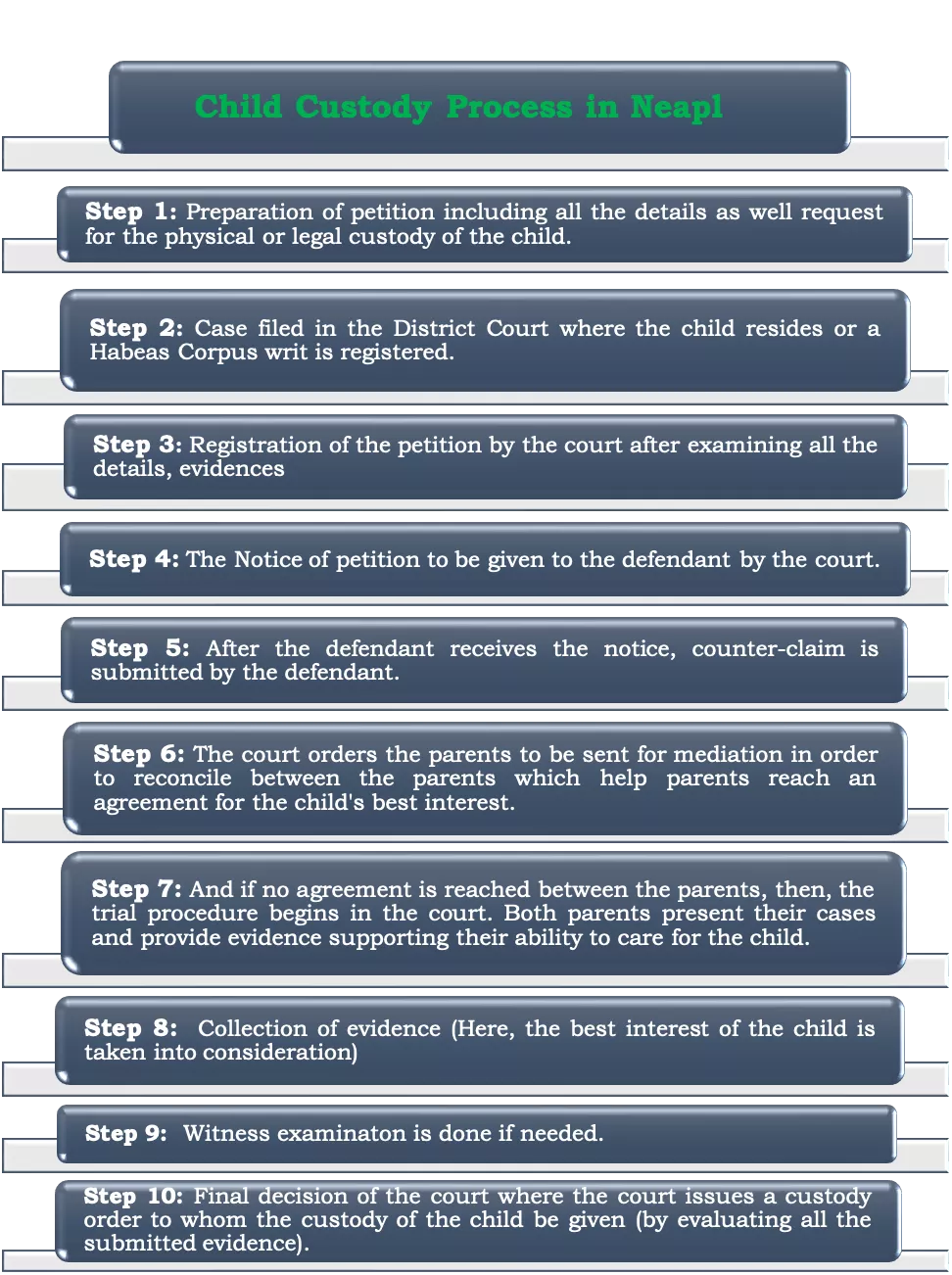Child Custody Process in Nepal
Child Custody Process in Nepal
This article will help you to know all the information about the legal provision of child custody after divorce in Nepal
1. Introduction:
Child Custody is the legal action to have the parental right on their child. Child custody refers to the legal and practical relationship between a parent or guardian and a child, involving the rights and responsibilities regarding the care, upbringing, safety, protection, decision-making and well-being of the child. Basically, the child custody cases arise particularly in situations of divorce, separation, or when parents are unmarried.
If separate agreement and consent is there within parents anyone can take the custody of child
2. Governing Laws relating to child custody in Nepal
- Muluki Civil Code, 2074
- Muluki Civil Procedure Rules, 2075
- Act relating to Children, 2075
3. Governing authority for child custody
- District Court of Nepal/High Court/Supreme Court
4. Who gets Child Custody?
- Is determined on the basis of child’s best interest and the consent/agreement of parents who will be able to provide better facilities and fulfill the needs and requirements of their child shall be given custody.
5. Factors to be considered in custody determination
Divorce and legal Separation can have both immediate and long-lasting impacts on the future of the child. For this, the court considers the following factors for the best interest of the child;

Child Custody in Nepal
6. Types of Child Custody in Nepal
The court while deciding for the custody of the child, usually considers some factors such as the age of child’s, the parents’ capability to provide child with best education and basic needs of the child, the bond of the child with each parent, and other essential arrangements. In context of Nepalese law, child custody typically falls into two main categories as:
- Sole custody of the Child
- Joint custody of the Child
- Sole Custody of the Child:
In this type of custody, only one parent has both legal and physical custody of the child. The court decides on sole custody based on the best interests of the child. In this type of custody only a single parent, either father or mother is liable or has right to make decision for the best interest of the child regarding the child’s upbringing, education, healthcare and the matters related the child’s life without obtaining consent from the other parent.
As per the National Civil Code of Nepal, 2074, the custody of the child be given either to father or mother after their divorce or separation in the following circumstances:
| S.N | Circumstances | Who can take custody |
| 1. | In the case of a minor who has not attained five years of age, and the mother if so, desires irrespective of whether or not she has concluded another marriage |
|
| 2. | In the case of a minor above five years of age, except where the mother has concluded another marriage |
|
| 3. | In other circumstances other than mentioned above |
|
| 4. | If the child is above ten years of age |
|
2. Joint Custody of the Child:
In this type of custody, both parents have the legal rights and responsibilities of the child. Both the parents, father and mother are equally responsible for making the decision together in and as for the best interest of the child regarding the child’s upbringing, education, healthcare, financial support and the matters related the child’s life. Not only decision making but the financial and maintenance expense are also borne equally by both the parents.
In the case of divorce or separation, the court usually takes decision considering the best interest of the child. According to Article 115(2) of Civil Code, 2074, if the husband and wife have made the separate arrangement and agreement regarding the child custody at the time of divorce, then the same agreement can be accepted by the court. The court grants the joint custody of the child usually in the divorce between the parents by mutual consent. The conditions and the parenting plans are jointly set out in the mutual application of the divorce. The court then decides the same for the joint custody of the child.
The legal rights and obligations of the parents towards their child shall remain in existence even after the divorce or legal separation of the parents.
Required documents for filing of Child Custody case in the District Court/High Court
Documents required for filing of the child custody case are mentioned below;
| S.N | Required Documents |
| 1. | Citizenship of the applicant parent/parents. |
| 2. | Birth registration certificate of the child. |
| 3. | Details of the parent/parents including their name, age and address. |
| 4. | Detailed information about the child whom the parents want to take custody. |
| 5. | Evidence/support documents like the records of parental involvement, communication logs, good character certificate of parents. |
| 6. | Document showing financial capability of parents like- income statements, tax returns and others. |
| 7. | Mutual agreement document (if the custody of the child be taken from the mutual agreement at the time of divorce which includes the plans for child’s care, support, and upbringing along with the visitation rights of the parents). |
| 8. | Petition document. |
8. Legal Procedure of Child Custody in Nepal:
The mother and the father of the child both have an equal right towards the custody of their children but who gets the custody is decided by the court. And in Nepal, child custody matters are primarily governed by the laws outlined in the National Civil Code, 2074, the National Civil Procedure Code, 2074 and the Childrens’ Act, 2075. The step wise legal court procedures for the custody of the child are as below:

Child Custody Process in Nepal
Note: While deciding the custody order, the court shall take into consideration the best interest of the child, considering their physical, emotional and psychological well-being as well child’s relationship with the parents, parental capabilities and financial situation of each parent.
9. Other circumstances for the custody of the child
In case of the separated husband and wife, and if they have a minor child, the child’s maintenance, education and healthcare or overall custody shall be as per an agreement done between them, in case of absence of such agreement, the custody of the child be as follows
| S.N | Circumstances | Who can take custody |
|
1. |
In the case of a minor below 5 years of age. |
|
| 2. | In the case of a minor child aged between five to ten years of age (5-10) |
|
| 3. | In the case of minor aged ten years or above (10-above) |
|
10. Legal Status of the person under the guardianship
As child being under the custody of the parents, there are certain legal rights and responsibilities of each parent for the best interest of the child. Some of the notable rights and obligations of the parent towards the child are as below;
Residence of the child:
The child shall live with the parent who has taken the custody of the child. The parent shall determine where the child resides and with whom they spend their time.
Visitation rights:
In the custody case, one parent shall have custody whereas another parent shall have visitation right time to time or anytime the parent wants to meet the child and spend time with the child.
Parental responsibilities:
Even if the parent has the sole custody of the child, another parent shall also have responsibilities to provide a better environment for the child’s upbringing, education, health care and other relative sectors.
Guardianship:
If either of the parent does not want or are unable to take custody of the child then, the court appoints the legal guardian to make decisions on behalf of the child.
Financial Support:
The parent who has taken the custody of the child shall financially support their child in their day-to day special basic needs, based on their respective income.
Decision making authority:
Here, the parent who has taken the custody of the child shall have all the decision-making authority for the best interest of the child in context of child’s education, healthcare, participation of child in various activities and other matters without having consent from the other party or if having joint custody, both the parents shall have equal rights in overall decision making concerning the best interest of the child.
Please contact us today itself if you are in search of corporate lawyers for registration of liaison office in Nepal on +9779841933745 or email info@lawinpartners.com
Disclaimer: All contains available here are for general information purposes. A proper legal solution always depends on your particular circumstances thus seek advice from an attorney who can provide assurances of the information contained herein and interpretation of it. All liability with respect to actions taken on the basis of the site’s information is hereby expressly disclaimed.
For quick legal assistance:
You can directly call to our legal expert: +9779841933745
Even can call or drop a text through What's app , Viber, Telegram and We Chat at the same number.
Also can do email on : info@lawinpartners.com
Get in Touch with Our Legal Experts
Have a question or need legal assistance? Fill out our contact form and our team of experienced lawyers in Kathmandu, Nepal will get back to you promptly.
Please include your WhatsApp or Viber number in the phone section if you'd prefer a direct call from one of our legal professionals.
We are here to provide trusted legal support tailored to your needs.
Phone : +9779841933745, +9779841933745
